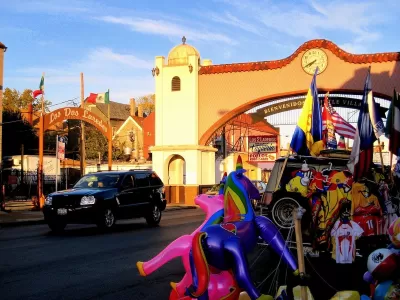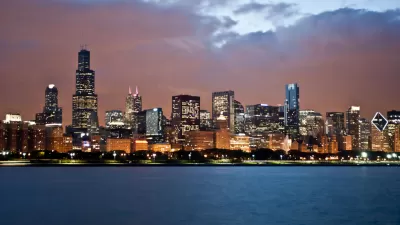Foot traffic and business in the largely Latino Little Village neighborhood declined by as much as 50 percent, with many businesses staying closed on Tuesday.

A normally bustling, predominantly Latino Chicago neighborhood became a “ghost town” by Monday afternoon as residents took steps to protect themselves against President Trump’s deportation plan and an extreme winter storm.
According to a Bloomberg article by Miranda Davis, Alicia A. Caldwell, and Daniela Sirtori, “Foot traffic at the 2-mile stretch of 26th Street in the Little Village neighborhood plunged — by some measures, the decline had hit the 50%-mark, according to Jennifer Aguilar, who heads the local chamber of commerce and spoke to a number of the 400 or so businesses in the area. On Tuesday morning, a number of shops were simply closed.”
Fears of raids could have serious implications for local businesses and the companies that employ immigrant workers, particularly in Chicago, which President Trump has promised to target. “When businesses have less foot traffic, they’re going to generate less revenue. That’s less taxation for our schools, for our health system, for our public safety, police departments, everything that keeps every Chicagoan safe,” said Rebecca Shi, chief executive officer at the American Business Immigration Coalition.
The authors note that the Little Village neighborhood “brings more tax revenue to City Hall than any other retail stretch other than the Magnificent Mile, the downtown shopping street that features luxury stores including Saks Fifth Avenue, Rolex and Burberry.”
FULL STORY: Threat of Immigration Raid Turns Chicago Hub Into Ghost Town

Maui's Vacation Rental Debate Turns Ugly
Verbal attacks, misinformation campaigns and fistfights plague a high-stakes debate to convert thousands of vacation rentals into long-term housing.

Planetizen Federal Action Tracker
A weekly monitor of how Trump’s orders and actions are impacting planners and planning in America.

Chicago’s Ghost Rails
Just beneath the surface of the modern city lie the remnants of its expansive early 20th-century streetcar system.

Bend, Oregon Zoning Reforms Prioritize Small-Scale Housing
The city altered its zoning code to allow multi-family housing and eliminated parking mandates citywide.

Amtrak Cutting Jobs, Funding to High-Speed Rail
The agency plans to cut 10 percent of its workforce and has confirmed it will not fund new high-speed rail projects.

LA Denies Basic Services to Unhoused Residents
The city has repeatedly failed to respond to requests for trash pickup at encampment sites, and eliminated a program that provided mobile showers and toilets.
Urban Design for Planners 1: Software Tools
This six-course series explores essential urban design concepts using open source software and equips planners with the tools they need to participate fully in the urban design process.
Planning for Universal Design
Learn the tools for implementing Universal Design in planning regulations.
planning NEXT
Appalachian Highlands Housing Partners
Mpact (founded as Rail~Volution)
City of Camden Redevelopment Agency
City of Astoria
City of Portland
City of Laramie





























